Our age bereft of nobility
How can our faces show it?
I look for love.
My lips stand out
dry and cracked with want
of it.
Oh it is well.
My poem shall show the need for it.
Again we go driven by forces
we have no control over. Only
in the poem
comes an image that we rule
the line by the pen
in the painter’s hand one foot
away from me.
Drawing the face
and its torture.
That is why no one dares tackle it.
Held as they are in the hands
of forces they
cannot understand.
That despair
is on my face and shall show
in the fine lines of any man.
I had love once in the palm of my hand.
See the lines there.
How we played
its game, are playing now
in the bounds of white and heartless fields.
Fall down on my head, love,
drench my flesh in the streams
of fine sprays. Like
French perfume
so that I light up as
mountain glorys
and I am showered by the scent
of the finished line.
No circles
but that two parallels do cross
And carry our souls and bodies
together as the planets,
Showing light on the surface
of our skin, knowing
that so much of it flows through
the veins underneath.
Our cheeks puffed with it.
The pockets full.
2.
Pushed on by the incompletion
of what goes before me
I hesitate before this paper
scratching for the right words.
Paul Klee scratched for seven years
on smoked glass, to develop
his line, LaVigne says, look
at his face! he who has spent
all night drawing mine.
The sun also
rises on the rooftops, beginning
w/ violet. I begin in blue
knowing why we are cool.
3.
My middle name is Joseph and I
walk beside an ass on the way to what
Bethlehem, where a new babe is born.
Not the second hand of Yeats but
first prints on a cloudy windowpane.
america, you boil over
4.
The cauldron scalds.
Flesh is scarred.
Eyes shot.
The street aswarm with
vipers and heavy armed bandits.
There are bandages on the wounds
but blood flows unabated. The bath-
rooms are full. Oh stop up
the drains.
We are run over.
5.
Let me ramble here.
yet stay within my own yardlines.
I go out of bounds
without defense,
oh attack.
6.
At last the game is over
and the line lengthens.
Let us stay with what we know.
That love is my strength, that
I am overpowered by it:
desire
that too
is on the face: gone stale.
When green was the bed my love
and I laid down upon.
Such it is, heart’s complaint,
You hear upon a day in june.
And I see no end in view
when summer goes, as it will,
upon the roads, like singing
companions across the land.
Go with it man, if you must,
but leave us markers on your way.
South of Mission, Seattle,
over the Sierra Mountains,
the Middle West and Michigan,
moving east again, easy
coming into chicago and
the cattle country, calling
to each other over canyons,
careful not to be caught
at night, they are still out,
the destroyers, and down
into the South, familiar land,
lush places, blue mountains
of Carolina, into Black Mountain
and you can sleep out, or
straight across into States
I cannot think of their names.
This nation is so large, like
our hands, our love it lives
with no lover, looking only
for the beloved, back home
into the heart, New York,
New England, Vermont green
mountains, and Massachusetts
Again to smell what this calm
ocean cannot tell us. The seasons.
Only the heart remembers
and records in words
of works
we lay down for those men
who can come to them.
7.
At last. I come to the last defense.
My poems contain no
wilde beestes, no
lady of the lake music
of the spheres, or organ chants,
yet by these lines
I betray what little given me.
One needs no defense.
Only the score of a man’s
struggle to stay with
what is his own, what
lies within him to do.
Without which is nothing,
for him or those who hear him
And I come to this,
knowing the waste, leaving
the rest up to love
and its twisted faces
my hands claw out at
only to draw back from the
blood already running there.
Oh come back, whatever heart
you have left. It is my life
you save. The poem is done.
6.18.58
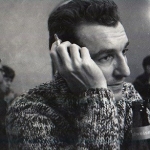


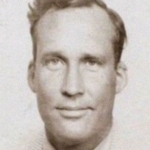









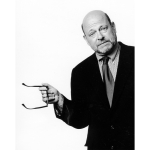


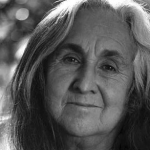
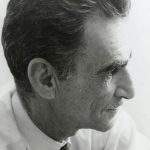
Comment form: